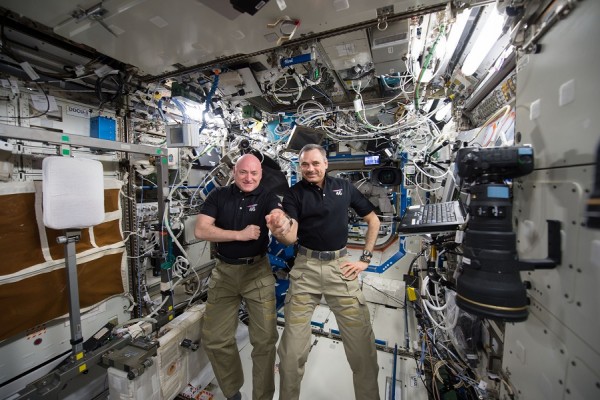By Ana Verayo, | February 26, 2016

NASA astronaut Scott Kelly and Russian cosmonaut Mikhail Kornienko marked their 300th consecutive day aboard the International Space Station on Jan. 21, 2016. The pair will land March 1 after spending a total of 340 days in space.
NASA astronaut Scott Kelly has finally completed his mission in space after spending 11 months aboard the International Space Station where the astronaut says he is still willing to stay in space for another year.
Like Us on Facebook
On March 1, Kelly along with Russian cosmonaut Mikhail Kornienko will return to Earth after completing their 340-day stay in the orbiting space laboratory where crew members usually stay at the station for about five to six months for a mission.
This mission that spanned almost one year is no easy task for Kelly, where he says that his isolation from loved ones and family were the most challenging part of his stay. However, apart from this, he feels good that he has the chance to break the record as the first human who spent the longest time in space under one mission, citing that he has improved physically and psychologically.
To date, this record is being held by cosmonaut Valeri Polyakov aboard the Mir Space Station during 1994 to 1995, where he spent 437 consecutive days in space.
During a news conference this week, Kelly said that he could go on for another 100 days. He adds that he can go another year if he had to, depending on the mission, although he admits to looking forward to getting home next week.
During Kornienko's and Kelly's mission, scientists are now investigating what are the significant long term effects of spaceflight which is also helped by Kelly's identical twin brother, Mark Kelly, who is also a former NASA astronaut, who stayed on Earth to serve as a comparison for Scott.
For this 11 month ISS mission, the main focus is to help prepare crews for future manned missions to Mars where space explorers will be required to spend years travelling in deep space to arrive to Mars. NASA officials plan to begin sending astronauts to the Martian system by the 2030s.
However, there are major physiological effects for staying in zero gravity for so long. Kelly reports that he noticed some changes to his vision during this long mission, which is a common side effect for being exposed to microgravity. In general, he also states that his body and mind still feels pretty good. He adds, even if I really look forward going home, it is not like I'm climbing the walls.
Kelly compared this mission to his last five month stay aboard the ISS back in March 2011, where he says that he was more eager to go home during that previous stay aboard the space station than this one. He says, this probably has something to do when my sister in law, Congresswoman Gabrielle Giffords, was shot two months before I returned back home in 2011.
Giffords is married to his twin brother, Mark Kelly, who is a Democrat representing Arizona's 8th Congressional District in the U.S. House of Representatives. She was shot in the head outside a Safeway store in Tucson in January 8, 2011. Giffords suffered a serious brain injury but survived.
-
Use of Coronavirus Pandemic Drones Raises Privacy Concerns: Drones Spread Fear, Local Officials Say

-
Coronavirus Hampers The Delivery Of Lockheed Martin F-35 Stealth Fighters For 2020

-
Instagram Speeds Up Plans to Add Account Memorialization Feature Due to COVID-19 Deaths

-
NASA: Perseverance Plans to Bring 'Mars Rock' to Earth in 2031

-
600 Dead And 3,000 In The Hospital as Iranians Believed Drinking High-Concentrations of Alcohol Can Cure The Coronavirus

-
600 Dead And 3,000 In The Hospital as Iranians Believed Drinking High-Concentrations of Alcohol Can Cure The Coronavirus

-
COVID-19: Doctors, Nurses Use Virtual Reality to Learn New Skills in Treating Coronavirus Patients







